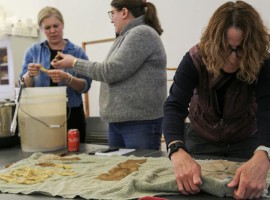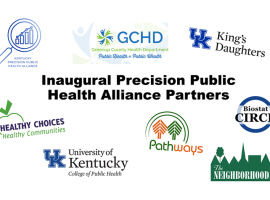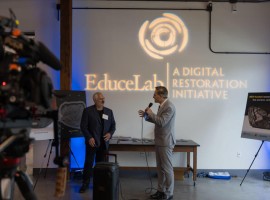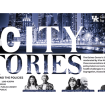BioBonanza Highlights UK Biology Research
On October 1, 2016, the University of Kentucky Department of Biology is hosting BioBonanza, a one-day open house festival.
BioBonanza will be held at the new Academic Science Building at 680 Rose Street on Saturday, October 1 from noon to 4 pm. Free parking is available in the parking garage on Hilltop Avenue, next to the Academic Science Building.
This free event will showcase interactive displays on research taking place in biology at UK. “As soon as you walk through the doors you’ll see all sorts of activities: displays of how a human heart works, butterflies and all sorts of insects, and you can even try to catch some local insects,” said Jennifer Simkin, a postdoc in biology who helped organize the event. “The displays will target high school and middle school students, but we’re going to have activities for people of all ages, so we welcome families. Students can come see the research and interact with the researchers.”
Those researchers include grad student Cole Malloy and his mentor neurobiologist Robin Cooper. They study how the nervous system adapts to changes in the environment using fruit flies and crayfish. Malloy said, “The breadth of the field is what drew me to biology. In high school I was more a chemistry guy, like my advisor, and when I came to UK I became more interesting in biology, especially genetics and neuroscience.”
This event is part of a month-long celebration of the 150th birthday of Thomas Hunt Morgan, Lexington’s first Nobel Laureate. Listen to this podcast and visit the BioBonanza Facebook page for more information.
BioBonanza Highlights UK Biology Research - Podcast Transcript
Have you ever wondered who was doing the research that will impact your future? The research podcast lets you met those people, and learn how the University of Kentucky is exploring and strengthening our understanding of the world through research and discovery.
Here's Alicia Gregory, director of Research Communications.
Alicia: Today we’re talking with Jennifer Simkin, a postdoc in biology who studies regeneration in African spiny mice. But she’s not here to talk about her work, she’s here to tell us about BioBonanza.
Jennifer Simkin: I’m responsible for making sure all the students and families know about BioBonanza and know that they’re welcome to come join us.
Alicia: So what is BioBonanza and what are the goals for the event?
Jennifer Simkin: BioBonanza is a one-day open house festival. All of the researchers in the Department of Biology are going to be showcasing their research. So students can come see the research, interact with the researchers, and we want people to be able to interact and have fun at this event.
As soon as you walk through the doors you'll see all sorts of activities. Displays of how a human heart works, we’ll have sections of spinal cord and brain. You’ll get to be able to see butterflies and all sorts of insects. You’ll be able to try to catch some local insects. And we’ll have activities like walking through local plant gardens and seeing how photosynthesis works.
Jennifer Simkin: The displays will target high school and middle school students, but we’re going to have activities for people of all ages. So we welcome families to come along with students.
Alicia: So tell us a little bit about when and where the event is gonna take place?
Jennifer Simkin: It’s on October 1, it’s a Saturday. It starts at noon and the activities are gonna run until 4 p.m. You can come and go as you please. It’s gonna be in the new Academic Science Building, which is 680 Rose St.
Alicia: So where can people park?
Jennifer Simkin: They can park in the garage off of Hilltop Avenue and parking is free.
Alicia: So tell me a little bit about the College of Arts & Sciences Department of Biology, that who’s hosting this event. How many faculty researchers are part of that department?
Jennifer Simkin: There’s about 40 researchers and teaching faculty.
Alicia: So it’s a pretty large department.
Jennifer Simkin: Yes.
Alicia: And how many students?
Jennifer Simkin: For undergraduates they teach about 1,600 undergraduates.
Alicia: Wow.
Jennifer Simkin: There is about 40 graduate and master’s students.
We do everything from human health, so looking at cardiovascular disease and also some sleep research, looking at circadian rhythms. We look at how animals can regenerate, so we can one day bring that into humans and help regenerate new tissue. There’s also groups that help look at how to improve the environment around us, so they do a lot of research into not only local Kentucky wildlife, but also local Kentucky plants and how to keep those healthy.
Alicia: I recently talked to neurobiologist Robin Cooper and grad student Cole Malloy. Malloy shared a little about himself and why he chose biology.
Cole Malloy: I’m a fourth year graduate student, but I’ve been here for seven years as a student. I’ve enjoyed it. I have an idea about the professors and the department and that’s kind of why I chose Dr. Cooper. He made an impact as an undergrad and that’s why I chose to join his lab. Luckily he allowed me to stay, so that’s nice. So we study, basically, how the nervous system adapts to changes in the environment, or synaptic plasticity and neuro plasticity.
Biology is such a broad field, from ecology to evolution, to neuroscience to cell biology, to computational biology, so there’s a lot of areas that a number of individuals can kind of find interesting. So I think the breadth of the field is what kind of drew me to biology. In high school I was more a chemistry guy, like my advisor, and when I came to UK, I became more interesting in biology, especially with genetics and neuroscience.
I think the genetics and neuroscience aspect comes from my background of being an identical twin. I’ve kind of always been interested in what makes my brother and I individuals, what about our nervous system development and how our environment has shaped our nervous system, and how we have different and unique personalities, given the fact that we are genetically identical. So yeah, that’s kind of always drawn me to understanding how the brain works.
Alicia: BioBonanza coincides with the fact that Thomas Hunt Morgan was born in Lexington 150 years ago. He was Lexington’s first Nobel Laureate. He graduated as valedictorian from what is now the University of Kentucky in 1886. And his work was the foundation for research that’s still being done in the UK biology department, including inside Robin Cooper’s lab.
Robin Cooper: So as you’re whacking around these fruit flies that are flying around the lab, you can see our primary research animals, one of them is a fruit fly, drosophila melanogaster, and another animal that we use in the lab are crayfish.
Thomas Hunt Morgan was an undergraduate at the University of Kentucky, and then he went on for graduate work and he was awarded the Nobel Prize, working with Drosophila as a model organism. A lot of people don’t realize though, Thomas Hunt Morgan, some of his first work was actually on regeneration of limbs in crustaceans. So I kind of find this a bit interesting that we’re working crustaceans as well as fruit flies and it’s the same as what Thomas Hunt Morgan used 100 years ago, but we’re not in such the old research questions, more modern research questions. But the power of genetics allows us to work with the drosophila and do things really you can’t do with any other organism, in the sense of rapid development, manipulate genes very quickly, and test out many different aspects from behavior to how the neuro circuits are formed. And you can relate whole animal behavior to the mechanisms behind that behavior. The fruit fly, I think now that the count is up to about 60 human diseases that are now modeled in Drosophila, everything from diabetes, to neurological issues, learning and memory for example.
Alicia: To learn more about this research, join us for BioBonanza on October 1st from noon to 4 pm. For more this event and the other events that are part of a month-long celebration of Thomas Hunt Morgan, visit our site reveal.uky.edu/podcasts.





